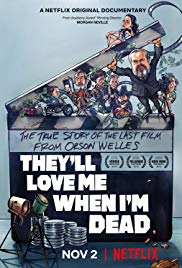
THEY’LL LOVE ME WHEN I’M DEAD
2018, 98 minutes, Colour/black-and-white.
Orson Welles, Oja Kodar, Peter Bogdanovich.
Directed by Morgan Neville.
This is a documentary on the making of Orson Welles unfinished drama, The Other Side of the Wind. It is a must-see film before watching the completed work after its release in 2018.
Some of those involved in the original film, actor Peter Bogdanovich, producer Frank Marshall, were able to work on the editing of Orson Welles’ vast amount of material to produce a two hour film.
The film is narrated, sometimes straightforwardly, sometimes coyly, by Alan Cumming.
This is a cinema essay, a historical exploration, a portrait of the eccentric director. The impact of the film will depend on audience interest in Orson Welles and the making of this film and their knowledge of his career.
The makers have created a narrative, with the use of footage of Welles on set, on television interviews, personal material and have combined it with clips from his films and photos. There is a range of talking heads and interviews but also having Welles himself reply and comment by picking out special moments from his own films like Touch of Evil, The Trial and his Shakespearean films. There is a mixture of black-and-white footage as well as colour, as there is in the completed film.
This is an opportunity to make an assessment of Orson Welles as an artist, as an eccentric personality, literally larger than life. Some of the material is expected, some not, especially his humour on talk shows and the scene with the Muppets. There are more twinkles in his eye than might have been expected.
The film goes back to his achievement in Citizen Kane, his making of The Magnificent Ambersons and the studios disappointed with it, continually cutting it, his being away in Brazil to make a documentary and his not returning when urged to intervene for the film. His virtuosity is seen in scenes from Lady from Shanghai, scenes from his Shakespearean films, Othello, Chimes at Midnight, the Don Quixote film.
There are reminders that he took on acting jobs in order to finance his films, a glimpse from Genghis Khan – but not from his powerful Cardinal Wolsey in A Man for All Seasons. There are quite a number of interviews with talk celebrities as well as a speech at his lifetime award, an opportunity for spruiking his film and getting finance.
But, most of this documentary is about the making of his film, extraordinary number of years that he worked on it, the range of people that he relied on. There is a lot on the choice of John Huston as the director and many of his scenes. The curiosity item is the response to Rich Little and his impersonations and the invitation for him to take a central role, his performance, falling out with Welles, disappearing. Because Peter Bogdanovich had been present, interviewing Welles, beginning his own career as a director, he then took on the role after Little left the project (and derogatory remarks on television with Burt Reynolds about Bogdanovich). Some scenes have a lot of directors and actors, and some interviews with some of them like Dennis Hopper.
There is the filming of many of the scenes and their performances – which means that when they appear in the film itself they make sense and make quite some impact. There are actors, the request to improvise, the actress with whom Welles was living, the waitress who brought the meals and was incorporated into the action.
The question is whether Welles was a perfectionist, or just bombastic, not finishing projects, not dealing well with producers and financiers, being swindled, difficulties with the Shah and Iran at the time of the revolution, and difficulties with copyright and ownership which was important in terms of French law and the impounding of the film.
Peter Bogdanovich and others were responsible for the final completion of the film and its release in 2018. It reached a wider public when it was taken up by Netflix.